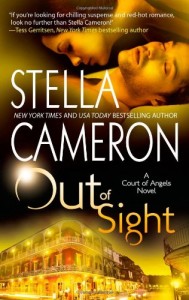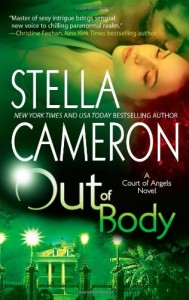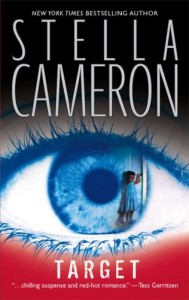Unless Marley Millet could find the victim, and quickly, it would be too late. Marley was convinced this was true and that she was the only one who could help.
In her crowded workroom on the third floor of J. Clive Millet, Antiques, on Royal Street in New Orleans, Marley paced in small circles, desperate for insight that would tell her how to find and rescue an innocent marked for murder.
On her workbench stood a red lacquer doll house, an intricate piece of nineteenth century Chinoiserie placed in her hands by a stranger for safe and secret keeping. She hadn’t and still didn’t know why, except that the house was the portal that led to a place of great danger for some. Above the curvy roof with flaking gilt twirls at each corner, a whirling sheath of fathomless gray took more definite shape, like a vaporous tornado. It shifted until its slenderest part disappeared through a wall of the doll house and the gaping maw at the other end crept closer to Marley. A current began to suck at her like a vast, indrawn breath
The decision to stay or give in and be pulled away, her essence drawn out of her body, was still hers.
Whispers came, a word, and another and another, never growing louder only more intense.
Marley pressed her hands over her ears but the sounds were already inside her head. The few whisperers became a crowd, and although she could not make out much of what they said, she knew they were begging. The Ushers, as she knew the voices, wanted her. They needed her. They were the last, invisible advocates for a life on the edge of an unnatural death, calling for Marley to witness a crime in progress. Witness, and act to save the victim.
Almost two weeks earlier, she had done as they asked and traveled away from her body to a place she did not know, and a woman she did not know. Evil had permeated the atmosphere there and Marley knew a murder was planned.
“You left her to die.” This time the Ushers spoke clearly.
“I don’t even know who she is.” Her own voice sounded huge.
“You saw her.”
“But I only saw the inside of a room. I don’t know where it was.”
The whispers softened and became a gentle hum. And Marley let out a long, emptying breath. Another word came to her clearly, “Please.” A woman spoke.
It could be the victim. Perhaps it was not too late. Yet.
Marley expected the unexpected. She always had, day-by-day, from her earliest recollections.
Today was no exception, but she needed to decide what to do next without pressure from the sickening emotion she felt now.
Winnie, her Boston Terrier, placed herself in Marley’s path and stared up at her. Black and shiny, the expression in Winnie’s eyes was almost too human. The dog was worried about her beloved mistress. Another step forward and Winnie flopped down on Marley’s feet, which meant she was imploring her boss not to leave her body. The dog had an uncanny way of sensing problems for Marley.
“Not you, too,” Marley said. “I need answers, Winnie, not more confusion. Now concentrate,” she told herself. “You’ve got a major problem.”
On that Sunday afternoon in June, Marley wrestled with a warning she’d received less than a week ago.
Her Uncle Pascal, current steward of J. Clive Millet Antiques, had called her to his top floor apartment. Speared by one of his most heated green stares, he had kept her there for more than an hour.
“Tell me you will do as you’re told,” he had said, repeatedly. “I don’t meddle in your affairs, but it is my job to watch over you. Certain alarms have been raised and I will not have you straying into dangerous territory. Defy me and I shall . . . I shall have to rethink my trust in you.”
By “alarms,” he meant that although she hadn’t told him about the red house she had been given, or what had already happened, he had sensed a distance in her. He suspected she might be playing around with portals to other realities again and said so. He had not explained why he thought so. And Marley had been just as calm about not admitting she had not only encountered a portal, but it had already led her on a journey she could not get out of her mind, day or night. All she had told her Uncle Pascal was that she was working hard and that long hours sometimes left her distracted. That was true, if not very helpful to her uncle. Where day-to-day issues were concerned, the Millets were in charge of their own actions, but Pascal had the final say in their powers threatened their safety.
Marley had been tempted to push him for an explanation of how he might make her regret disobedience, instead she had lowered her eyelashes and made a subservient sound.
“Good, good,” Uncle Pascal had said, expanding his muscular chest inside a green velvet jacket. “You are a kind girl. You four girls make a poor bachelor uncle think he’s done fairly well bringing up his brother’s children safely.” He smiled at his mention of ‘you four girls,’ by whom he meant Marley and her three sisters, but had then given her a slight frown which they both understood that her outlandishly talented maverick brother, Sykes, was not a subject for discussion that day.
That had been then, when she wanted to please someone who, unlike her parents, had always been there for her. This was now, days later, and the curiosity that came with her ability to be called away from her body, to travel invisibly into another location, was once more too provocative to ignore.
Marley crossed her arms and stared at the doll house. The trembling cone of whirling matter sparked flashes of green, then blue. It was unlikely that more than a handful of people anywhere would be able to see the manifestation at all. Unlike aura readers, energy sentients were rarer than goldfish teeth. She was one of that elite number and brother Sykes, hidden away wherever he had his mystery-shrouded sculpture studio, was another.
Marley wasn’t a child. She was thirty and her irresponsible parents had been exploring the world for twenty years. The only way any of Antoine and Leandra Millet’s offspring managed to see them was by tracking them down in distant places. Marley’s older sisters, Alex and Riley, were in London with their parents right now. Even if A and L, as the rest of the family dubbed them, were supposedly searching for the key to neutralize a family curse, who cared what they might think about the way their children lived, or how careful they were or were not?
But in a weak moment before his piercing stare Marley had, more or less, given her uncle the impression that if she encountered even a hint of subversive force, no matter how alluring she might find it, she would turn her back on whatever it was at once.
Boring.
Uncle Pascal was not a man to be easily frightened or to give fanciful warnings. Marley knew she could wriggle out of the agreement she’d made with him, but if she defied him and went too far with an experiment, her life might be changed forever.
In fact, her life could well be over.
On the other hand, it did not have to be and she was hearing seductive whisperings from The Ushers, the invisible forces that were her companions when she heeded their cries and went traveling through parallel time.
The Ushers were back after only days. They never came unless she was needed, always somewhere right in New Orleans, always immediately. On this humid afternoon, a great urgency lapped at her.
Like a whirlpool, the funnel into the doll house spun faster and faster. Soft, faintly vibrating, this apparition was familiar, as were the increasingly desperate waves of sensation beckoning her closer.
Apart from brushes with malignant spirits who tried to block her path, she had never encountered real danger on her journeys. But she did know of the terrible threat she faced. If she ever lost her way back, her soul could be forever separated from her life, from her living body. She would known manic terror while she searched for a way to return. If she failed, she would forever toss free, carried by the demanding currents of those on the edge of death and begging her to save them?
During each of her earlier travels she had done good things, brought about rescues for people who would never even know her name—until her most recent transfer through a parallel space, the one she had not mentioned to her uncle.
She had lied by not talking about it and guilt didn’t make a comfy companion.
Despite the cry she had heard only moments ago, Marley believed that someone in New Orleans, a woman she had been called to help, must be prematurely dead by now. Without knowing who the victim had been or exactly what happened to her, Marley was convinced she had kept company with a victim’s final heartbeats, seen through her now-dead eyes.
At her feet, satiny black and white and giving off waves of displeasure, Winnie snuffled irritably. The dog was a barometer of Marley’s moods and objected to these moments when she sensed she was not uppermost in her favorite person’s mind. Winnie was ignoring her constant companion, a huge plastic bone, and this was a sure sign that she wasn’t happy.
Absently, Marley used her bare toes to squeeze one of Winnie’s feet.
What if the woman hadn’t died? What if she was still alive and reaching out, one last time, for help?
Marley switched off the lights over her bench and reluctantly made her way between aged pieces of furniture and objets d’art awaiting her attention. She was known as one of the best restorers of antique lacquer and gold leaf in the city.
Her door onto a tiny landing outside was shut. Stained glass panels, richly emerald, ruby, sapphire and amethyst, glowed, dappled faint colors on the dusty wooden floors in the dim workroom.
For some seconds, Marley rested her hand on the latch. Then she turned it, thumped the heavy bolt home. Anyone trying the handle from the outside would know to leave her alone.
She retraced her steps and stood in front of her bench again. All around her, the air buzzed and popped. Here and there she caught sight of partly formed faces, their mouth open as if calling out.
Slowly, her feet and legs heavy, Marley stepped backward, once, twice, three times until her calves bumped into her cracked, brown leather wing chair, and she sank onto the seat.
“Don’t go,” she told herself aloud.
Too late. The separation had already begun. Luminous green brushed the tunnel, spun quickly and turned the vapor to shimmering water. Inviting. Marley felt it’s warmth, it’s temptation. She touched it with her fingertips, drew it open wider. It’s matter adhered to her skin. Her own weight slipped away and she was free, gliding through the iridescent tunnel toward a pulsing black membrane.
The membrane opened, slid apart like the aperture in a camera lens. Scents of age and dampness rushed at her.
Wetness shone in grimy rivulets on the concrete walls of an empty room. This was the room she had been in last time. Ahead of her the door to some sort of compartment—or locker—stood wide open, a thick, heavy door with no handle on the inside.
In the opening a woman in red gradually appeared from clouds of icy mist.
Not the same woman as the last time.
Dark-haired as the other had been, rather than being striking and voluptuous with a single black birthmark above her mouth, this time the facial features were pointed, the eyes large beneath thickly painted lashes Behind her thin figure, the mist hovered around hooks hung from a slowly revolving rod, and billowed over white, rectangular boxes placed in a precise row.
Shapes, indistinct, swung heavily just out of clear sight. Marley thought they were suspended from the hooks.
She shivered. Cold struck painfully into her brain. She should go back but she could not look away from the woman, from her pale, pleading face.
Then the woman smiled. She cocked her head to one side, listening to a deep voice as mellifluous as warm honey falling from a crystal spoon into a golden bowl. The voice said, “Come to me, child.”
Nodding, the woman appeared in a trance.
The voice darkened, caressed but with force. “Join me, child. Now. Come to me, now.”
And she began to drift away, back into the space behind the heavy door.
“Wait!” Panicked, Marley moved her presence forward. “Let me help you. Come with me.” From experience, she knew she couldn’t be heard and that only if she managed to bring help from the real world to this place would there be any help for the woman.
But there were no clues as to where she was.
The door began to close and Marley could scarcely breathe. She thrust herself forward, clawing at air as if it would help her move faster, and she collided with the creature in red. Instantly she felt consumed into rigid flesh, bone-cold flesh, and she cried out, “I must go back.”
The wrench to separate again sapped her consciousness. She could not slip into sleep here, must not. The Ushers mumbled very close and Marley focused on their sounds. She gathered strength and once more she heard the thump, thump, thump of a heartbeat that was not her own, and saw through eyes that didn’t belong to her. This woman wasn’t yet dead, then.
She struggled, staring ahead, willing herself to break free. And as she did she cried out to the woman, “Hold my hand. Come with me now.” While she talked, she searched around for any clues to her location. Nothing.
Her fingers, repeatedly reaching for the woman, came back empty each time.
A man stood with his back to her, a tall, dark-haired man, with wide shoulders and a straight, unyielding spine. He had a different substance and dimension from either the woman or their surroundings.
Marley had started to shift. Faint warmth entered her, and she caught sight of the funnel regenerating, its direction switched so that the large opening faced her again. Still vaporous, it took on the green tint.
Thrusting forward like a swimmer with the pool wall in sight, she made to pass the man and he looked at her over his shoulder. For one instant she cringed at the directness of his gaze, the hardness of a mouth that should be beautiful, despite a thin white scar that slashed through both lips and upward across one cheek in several slashes.
But he couldn’t see her, could he? She must be imagining that he was staring at her.
Marley gave a last, horrified look to where the woman had stood, only she had disappeared. A last thought as she felt a familiar, dragging pull, was that she knew why the man seemed out of place: She saw him not in color as she did the rest her surroundings, but in the gray shades of a black and white photograph. And as she stared at him his face changed again. The corners of his mouth tilted up and the scars faded.
2:00 a.m. the following morning outside The Court of Angels on Royal Street in the French Quarter:
He nodded and faced the street to step off the sidewalk. His hands were deep in his pockets. Every move he made flowed. He had a powerful grace, like a big cat.
She shouldn’t have gone to that club alone. More than that, she should not have allowed Gray Fisher to walk her through the French Quarter at this time of night—or morning. Anything could have happened.
The instant before she looked away, Gray Fisher glanced at her over his shoulder.
That look wasn’t soft or humorous anymore. Just for a flicker of time he stared, and Marley went into the antique shop and slammed the door. She shot home the locks.
It was the light, it had to be. But then, it had been the light the first time she saw hardness in those eyes that looked black, not whiskey-colored anymore. The light had turned his face into a facsimile of a black and white photograph. What the living face amazingly concealed, a negative image revealed: a thin, white scars passed through Gray’s mouth, sliced upward beside his nose and across his cheek.












